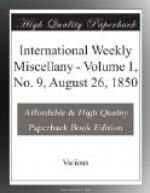A work of this kind is invaluable to the student who would make himself master of Mahometan jurisprudence as a system. But great care must be taken not to misapprehend the exact nature of the knowledge to be obtained from it. The “Futawa Alumgeeree” is a systematic exposition of the principles of Mahometan law; it assuredly does not enable us to ascertain what doctrines of that law are now of legal force in India, or even what doctrines have at any time had force in India. It does not appear to have been Aurungzebe’s intention to promulgate it as a code, but to present it to lawyers as a complete text-book. Even if he did by ordinance attribute to it the power of law, such ordinance was only effectual at any time in the provinces of the Mogul Empire; and since the disruption of that empire, it has been superseded and modified by laws and the practice of law-courts in the various independent states erected on its ruins.
Again the general scholar must be on his guard against the delusion that he will find in this digest materials illustrative of the social condition of India under the Mogul dynasty. The juridical works excerpted in it are almost all foreign to Hindostan; the special cases illustrative of abstract doctrines are taken from other countries, and many of them from ages antecedent to the invasion of India by the Moguls.
Though Persian was the court language of the Mogul dynasty, there is scarcely any Persian element in Aurungzebe’s legal compilation. The Shiite views of jurisprudence, as of theology, prevailed in Persia; the “Futawa Alumgeeree” is strictly Sunnite. It is not difficult to account for this.—The Mahometan conquerors of India were mainly of Turkish or Tartar race; they came from Turan, a region which from time immemorial has stood in antagonistic relations to Iran or Persia. This may account for the fact that the races of Turan which have embraced Mahometanism have uniformly adhered to the Sunnite sect—the




